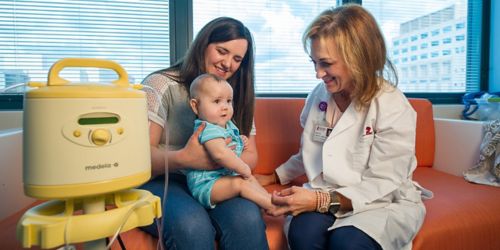St. Jude Family of Websites
Explore our cutting edge research, world-class patient care, career opportunities and more.
St. Jude Children's Research Hospital Home

- Fundraising
St. Jude Family of Websites
Explore our cutting edge research, world-class patient care, career opportunities and more.
St. Jude Children's Research Hospital Home

- Fundraising
Childhood cancer survivors and breast-feeding: Good for baby, good for mom

Ginger Carney, Director of Clinical Nutrition, listens to St. Jude patient Melissa Groves, mother of 7-month-old St. Jude patient Nathan, as part of lactation consultation.
Those in the nutrition field sometimes say a baby needs three things—warmth, in the arms of its mother; nourishment, from her breasts; and security, in the knowledge of her presence.
A breast-fed baby gets all three.
But did you know childhood cancer survivors who make a choice to breast-feed gain important health benefits from this decision, too?
Without question, babies who are fed breast milk get the best possible nutrition. Studies show these babies have a lower risk for sudden infant death syndrome (SIDS), infections, asthma, obesity, diabetes and other conditions.
Studies also show a lower risk of acute lymphoblastic leukemia, Hodgkin lymphoma and non-Hodgkin lymphoma for babies breastfed for more than six months.
For decades, researchers and clinicians have succeeded in incrementally increasing the childhood cancer survival rate, a mark of progress in the treatment of leukemia, brain tumors and other life-threatening malignancies.
Yet survivors often struggle with “late effects,” the health problems that occur months or years after treatment has ended. These can include obesity, early-onset osteoporosis, heart disease, diabetes and second cancers.
While it’s not a cure-all, breastfeeding can alleviate many late effects in childhood cancer survivors; it can boost metabolism, increase calcium reabsorption, reduce maternal stress and postpartum depression, and decrease the risk of diabetes. Breastfeeding also reduces the subsequent maternal risk of breast, uterine and ovarian cancer.
Unfortunately, the surgery and radiation used to treat cancer may affect lactation in some childhood cancer survivors, an important finding highlighted in 2011 in the Journal of Cancer Survivorship by Susan Ogg, RN, Nursing Research, and James Klosky, PhD, a former Psychology Department member of St. Jude Children's Research Hospital. In these challenging cases, consultation with a St. Jude lactation specialist might help.
Healthy People 2020, a science-based initiative of the U.S. Department of Health and Human Services Office of Disease Prevention and Health Promotion, recommends babies consume only breastmilk during the first six months of life. Mothers can then gradually introduce age-appropriate solid foods, while they continue to breastfeed until at least the baby’s first birthday.
Proceeding in this way, a mother and child gain the full benefits of breastfeeding. Incidentally, the advantages of breastmilk and breastfeeding accrue with time and repetition.
Although breast-feeding challenges occur, professional lactation support can assist mothers in reaching their breast-feeding goals. Ogg continues to research the challenges childhood cancer survivors have when breast-feeding their babies because there is limited information about lactation-related problems. Learning what can influence successful breast-feeding will help us counsel survivors before and after pregnancy.






